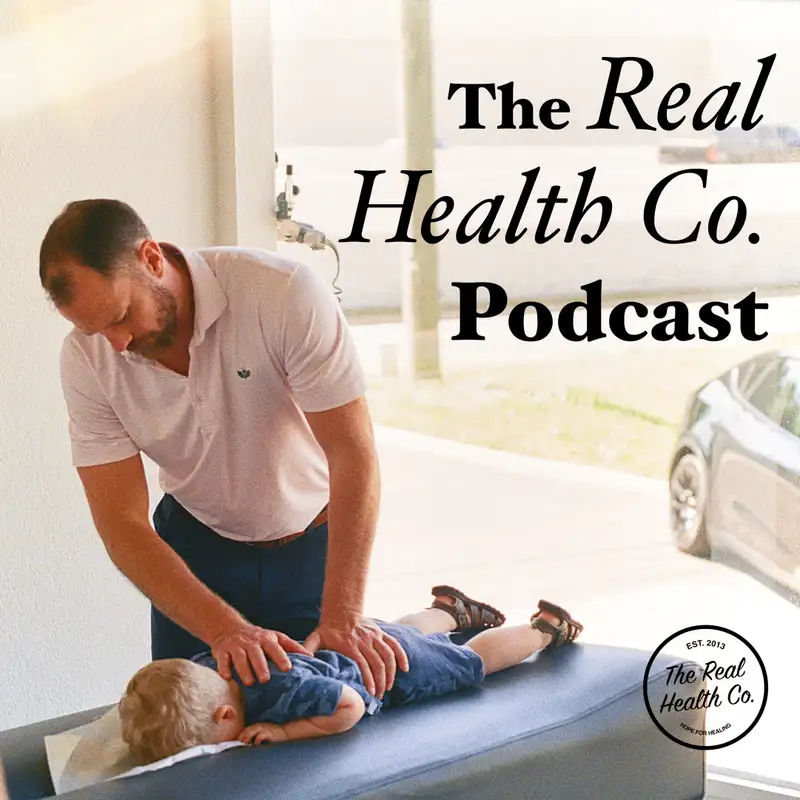 Episode 106
Episode 106
· 12:05
In the latest episode of The Real Health Podcast, we talk about the top ten tips to balance blood sugar, plus an advanced tip. Instead of taking notes or looking at the transcript, we actually have this document all written out for you that you can get in our resources tab at realhealthco.com. Go to the resources tab and look for balancing blood sugar. Again, that's realhealthco.com.
Dr. Barrett:Well, welcome back to another episode of the Real Health Podcast. Our vision is to add value to your health journey in a period of time that is hopefully under 20 minutes. So we're trying to power pack kind of this time of value, so that you can make just real health decisions, that are super practical, applicable. And this jump start January, we've been talking about lists like top 10 foods and top 5 beverages and what to avoid and what to start consuming to live a healthier 2025. One of the most important, I would say, focuses of anyone's health journey should be on blood sugar management or balancing your blood sugar. This is not for your- not just for your type 2 diabetic.
Dr. Barrett:Okay? We're talking about for everyone. We wanna avoid blood sugar crashes as well as the, unnecessary elevations or spikes. So we're today, I'm gonna give you 11 things to do to balance your blood sugar. Okay?
Dr. Barrett:I was talking to a patient this week, I think it was yesterday, and we're having a discussion on if you wake up in the middle of the night, this podcast is for you. Why? Because one of the number one things, that drives insomnia or waking up in the middle of the night is imbalanced blood sugar or blood sugar crashes at night that then spike a set of hormones like cortisol stress hormones that regulate or increase your blood sugar but then also keep you up for the rest of night. So this one is for you. If you feel irritable, hangry because you've missed a meal for 4 or 6 hours, this one's for you.
Dr. Barrett:If you can't fast, this one's for you. We're not only gonna talk about balancing blood sugar, but we're gonna talk about something called metabolic flexibility, which is being flexible to switch between carbohydrates and fats as fuel sources so that your body can continue to create energy even when you go 12, 16, 18, 20 4 hours without any source of calories. So let's talk about it. Let's dive into it. Here's how to do it effectively.
Dr. Barrett:Number 1, you have to focus on protein. Increasing high quality protein with every meal, like the items we talked about last week, grass fed meats, wild caught salmon fish, eggs, it helps slow down the absorption of carbohydrates and it stabilizes your blood sugar. Prioritize or focus on protein. Number 2, prioritize healthy fats. Incorporate fats like avocados or olive oil, coconut oil, ghee, grass fed butter, nuts, seeds.
Dr. Barrett:We talked about chia seeds last weekend. Again, salmon or fatty fish. Fats provide a sustainable source of energy and can help prevent blood sugar spikes, and especially the blood sugar crashes. Number 3, choose low glycemic vegetables. Low glycemic vegetables.
Dr. Barrett:So low glycemic means that it's not gonna raise blood sugar when you consume that particular food. So what's low glycemic? Low glycemic would be dark green leafy vegetables, broccoli, cauliflower, kale, zucchini. These are nutrient dense, so high micronutrients dense vegetables that are low glycemic. So high fiber, low glycemic.
Dr. Barrett:What do we wanna avoid? We want number 4, we wanna avoid or limit. And if you're really trying to push hard, the advanced tip here is to completely avoid high glycemic fruits. Okay? High glycemic fruits would be like your bananas and pineapples, dried fruits, which can spike blood sugar.
Dr. Barrett:Stick to lower glycemic fruits like berries, green apples, and citrus fruits. And if you're trying to trying to really dial in your blood sugar, avoid all fruit together. Avoid all fruit together. I thought fruits healthy, yes, but our intention is to create balanced blood sugar, to regulate blood sugar. And if we're trying to regulate blood sugar, we've gotta remove unnecessary carbohydrate elevations that you may have an issue with properly digesting, absorbing, utilizing in terms of blood sugar, sugar in the blood.
Dr. Barrett:Number 5, we wanna incorporate resistant starches. What does resistant starches mean? I mean starches that are like sweet potatoes because they help improve gut health but also have a just a smaller impact on your blood sugar. Okay? So remove those fruit instead of instead of the fruits add in resistant digestive resistant starches.
Dr. Barrett:Sweet potatoes are a great option here. Number 6, eat small balanced meals throughout the day. Now here's the progression, I thought you said always eat 3 meals a day, no yes. Here's the progression. You're early on in balancing blood sugar, or I'm not gonna you don't wanna hit it too hard, wanna eat 4 or 5 small meals that are protein, healthy fats, carbohydrates we just talked about, 4 or 5 of those throughout the day, every 3 hours or so.
Dr. Barrett:Okay? That's the first point with avoiding large portions of carbohydrates, balanced protein, fat, fiber, and then you can transition to 3 meals a day after that. Okay? And that's the ideal. 4-4-1-2, 4 hours between breakfast, lunch, 4 hours between lunch and dinner, and 12 hours between, at minimum, between dinner and next day breakfast.
Dr. Barrett:Okay? 4 for 12, 3 meals a day. But you may need to start at 5 and that's okay. Number 7, avoid those, like, even like the healthy treats. Healthy treats have a lot of honey in them, and it will unnecessarily spike your blood sugar.
Dr. Barrett:So they have honey, maple syrup, coconut sugar. Are those healthy? Yes. But, again, we're gonna avoid healthy processed sugars. These are what I would consider healthy.
Dr. Barrett:I would consider honey very healthy. I consider maple syrup very healthy. But if you're trying to regulate blood sugar, we need to avoid these. Number 8, drink plenty of water throughout the day. Water 1 alone, hydration alone can impair, dehydration can impair glucose regulation.
Dr. Barrett:So dehydration can impair glucose regulation or blood sugar regulation. So drink plenty of water. And when you consume water, k, water's fantastic to even kind of curve your cravings if you're not used to 3 meals per day. Number 9, exercise every single day. Maybe that's 10,000 steps a day, maybe that's walk 20 minutes, maybe that's weight train.
Dr. Barrett:Ideally, we need to incorporate strength training and some type of high intensity, burst style training. It's one of the most effective ways to help support a healthy nervous system as well as balance blood sugar. Number 10, we wanna manage our stress. Manage our stress is so important. Cortisol spikes throughout the day, chronic stress, and decreased sleep can disrupt cortisol and insulin balance.
Dr. Barrett:And this is a vicious cycle. When our blood sugar is dysregulated, we get cortisol unnecessary cortisol spikes at night. When we get unnecessary cortisol spikes at night, we get dysregulated sleep which leads to dysregulated blood sugar. So how do you break the cycle? Number 1, you balance your blood sugar with these tips I'm giving you.
Dr. Barrett:Number 2, you help improve your nighttime sleep. I did a sleep podcast last year, listened to it on how to hack your sleep. Number 11, this is the advanced tip. So it's really 10 plus an advanced tip and here's your advanced tip. If you've done all these 10 steps and you feel like you can eat 3 meals a day, you can start kinda feeling like your energy levels are getting better, your blood sugar is starting to regulate, there's an advanced tip and this is: start to experiment with intermittent fasting.
Dr. Barrett:You don't do it every day. Pick one day a week and try to go 12 hours, 16 hours, 18 hours, 24 hours without eating. This will create what's called metabolic flexibility. Metabolic flexibility. This is really where we start to push the boundary of how our body can efficiently utilize fats for energy as we deplete our glucose storage or glycogen storage from our liver, and this will long term long term create such a great opportunity for your body to get into extended levels of fasting as you progress your blood sugar regulation system, okay?
Dr. Barrett:As you get better, we call insulin sensitivity. So 10+1, those are your tips to create a balanced blood sugar. If you are dealing with chronic disease, arthritis inflammation, brain fog, loss of sleep, insomnia, right? Like energy crashes at like 2 o'clock, you blood sugar is probably something you have to look at. And unless you have a CGM, a continuous glucose monitor, you may not know that blood sugar is probably the most important area that you could focus on in 2025.
Dr. Barrett:If you have stubborn belly fat that won't go away, blood sugar. Okay? You've worked so hard, why is it blood sugar? Let's look at balancing our blood sugar in 2025 to live a healthier life. Those are your 10 plus your advanced tip, tips and tricks on balancing blood sugar.
Dr. Barrett:Thanks so much again as always for listening to the Real Health Podcast. If you want this doc if you want this document, then all you have to do is go to realhealthco.com, and under the resources tab, you'll find this document to help you on your journey. Thanks for listening to another episode of The Real Health Podcast.
Dr. Barrett:Our passion is to add value to your healthcare journey. Anything that we do, we want to do it within a community to help as many people as possible. Thanks for listening to episodes of the Real Health Podcast. If you could like, if you could subscribe, and you can share, it would help our mission to reach as many people with real health that produces real results for real people.

Listen to The Real Health Co. Podcast using one of many popular podcasting apps or directories.